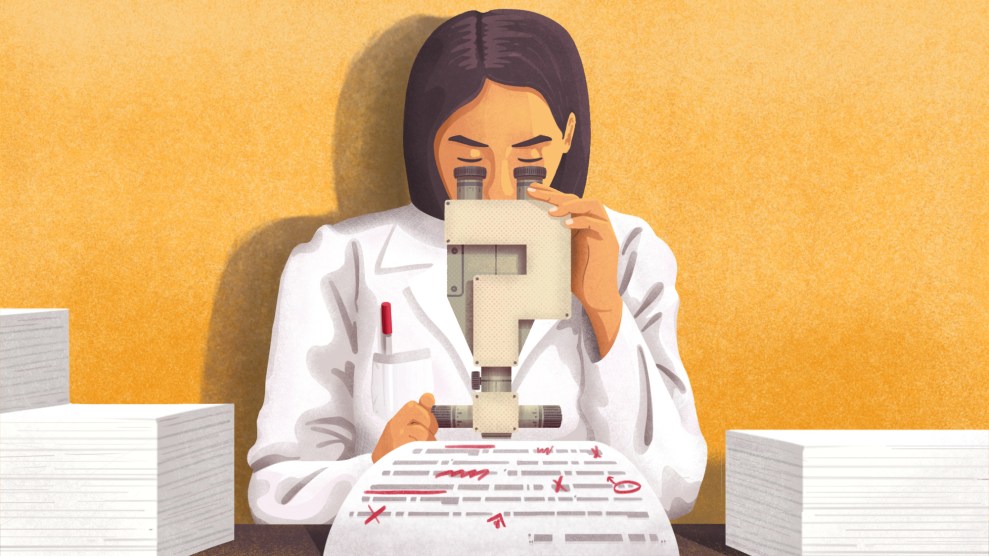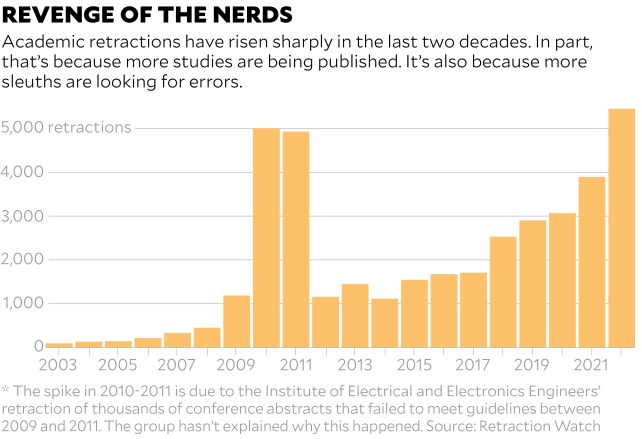[ad_1]

Vito Ansaldi
It’s been a hell of a yr for science scandals. In July, Stanford College president Marc Tessier-Lavigne, a outstanding neuroscientist, introduced he would step down after an investigation, prompted by reporting by the Stanford Every day, discovered that members of his lab had manipulated knowledge or engaged in “poor scientific practices” in 5 educational papers on which he’d been the principal creator. A month beforehand, web sleuths publicly accused Harvard professor Francesca Gino—a behavioral scientist finding out, amongst different issues, dishonesty—of fraudulently altering knowledge in a number of papers. (Gino has denied allegations of misconduct.) And the month earlier than, Nobel Prize–winner Gregg Semenza, a professor at Johns Hopkins College of Medication, had his seventh paper retracted for “a number of picture irregularities.”
These are simply the high-profile examples. Final yr, greater than 5,000 papers have been retracted, with simply as many projected for 2023, in response to Ivan Oransky, a co-founder of Retraction Watch, a web site that hosts a database for educational retractions. In 2002, that quantity was lower than 150. Over the past twenty years, whilst the general variety of research printed has risen dramatically, the speed of retraction has truly eclipsed the speed of publication.
Retractions, which might occur for quite a lot of causes, together with falsification of knowledge, plagiarism, dangerous methodology, or different errors, aren’t essentially a contemporary phenomenon: As Oransky wrote for Nature final yr, the oldest retraction of their database is from 1756, a critique of Benjamin Franklin’s analysis on electrical energy. However within the digital age, whistleblowers have higher expertise to research and expose misconduct. “We’ve got higher instruments and better consciousness,” says Daniel Kulp, chair of the UK-based Committee on Publication Ethics. “There are in some sense extra folks trying with that important mindset.” (It’s a bit like how in america, the rise of most cancers diagnoses within the final twenty years might partly be attributable to raised, earlier most cancers screenings.)
“If you incentivize folks to publish, however you’ve got basically no penalties for fraudulent publication—that’s an issue.”
Actually, specialists say there ought to most likely be extra retractions: A 2009 meta-analysis of 18 surveys of scientists, as an example, discovered that about 2 p.c of respondents admitted to having “fabricated, falsified, or modified knowledge or outcomes no less than as soon as,” the authors write, with barely greater than 33 p.c admitting to “different questionable analysis practices.” Surveys like these have led the Retraction Watch crew to estimate that 1 out of fifty papers should be retracted on moral grounds or for error. At present, lower than 1 out of 1,000 get eliminated. (And if it looks like behavioral analysis and neuroscience are notably retraction-prone fields, that’s doubtless as a result of journalists are inclined to give attention to these circumstances, Oransky says; “Each discipline has problematic analysis,” he provides.)
The difficulty is, authors, universities, and educational journals have little incentive to establish their very own errors. So retractions, in the event that they do occur, can take years. “Publishers sometimes reply to fraud allegations like molasses,” says Eugenie Reich, a Boston-based lawyer who makes a speciality of representing educational whistleblowers. Partially, that’s due to authorized legal responsibility. If a journal publishes a correction or a retraction, Reich notes, lecturers whose work known as into query might sue (or threaten to take action) over the hit to their popularity, whereas whistleblowers who flag an error are unlikely to sue journals for taking no motion. Harvard’s Gino, as an example, sued the college and her accusers in August for no less than $25 million for defamation.
Nonetheless, with hundreds of retractions per yr, it’s clear the scientific file might use some scouring. One potential answer, Oransky suggests in Nature, is to reward and incentivize sleuths for figuring out misconduct, very like how tech corporations (and the Pentagon, apparently) pay “bug bounties” to individuals who discover errors of their code. Boris Barbour, a neuroscientist and co-organizer with PubPeer, a preferred web site for discussing educational papers, additionally notes that it’d assist if authors or journals printed the uncooked knowledge supporting a paper’s findings—one thing funders of the analysis might mandate—to permit for extra transparency and accountability. (The Nationwide Science Basis, a serious federal funder of analysis in america, plans to start out requiring public entry to datasets someday in 2025, a spokesperson informed me, in response to a White Home memo final yr.) “Will probably be tougher to cheat, simpler to detect. Science would simply be greater high quality,” Barbour says.

Oransky suggests going even deeper, and addressing why individuals are moved to cheat within the first place. In science, it’s too usually “publish or perish,” he says, using a phrase that dates again to the Nineteen Thirties. “The issue is simply how a lot of educational status, profession development, funding, all of these issues are wrapped up in publications, notably in sure journals. That’s on the core of all of it.” Or, as Reich put it, “If you incentivize folks to publish, however you’ve got basically no penalties for fraudulent publication—that’s an issue.” To incentivize trustworthy analysis, Kulp suggests encouraging journals to simply accept and publish research that present a scarcity of outcomes—failures, basically. In biomedical analysis, as an example, an estimated half of medical trial outcomes by no means get printed, in response to the Middle for Biomedical Analysis Transparency, a not-for-profit group that’s working to encourage the publication of “null” outcomes—when a therapy will not be efficient—in journals like Neurology, Circulation, and Stroke.
And that’s the irony of all this. In science, we’re taught errors are important. With out failure, there’s no progress. If journals, universities, and students—starting with these in our most prestigious labs—stopped hiding from error and embraced it, we’d all be higher for it.
[ad_2]
Source link



